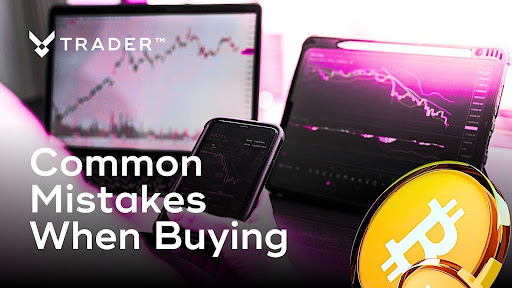Common Mistakes When Buying Bitcoin—And How to Avoid Them Like a Pro
This guide is part of the “Guide to Bitcoin” series.
If you’ve ever thought, “I should get into Bitcoin,” you’re not alone. But did you know that more than half of first-time buyers make at least one totally avoidable mistake? Whether it’s clicking on the wrong link, trusting the wrong platform, or just diving in without a plan, it’s easy to lose money—or your sanity. The good news? A little prep goes a long way. By the end of this post, you’ll be equipped to sidestep the biggest rookie errors and feel more confident in your crypto game.
Buying Bitcoin can feel exciting—like you’re finally joining a conversation the internet’s been having for a decade. But enthusiasm without a game plan? That’s how people get burned. Below are the most common pitfalls we see new and even intermediate traders fall into. And yeah, we’ll also show you how vTrader makes the process a lot less overwhelming.
1. Jumping in Without Doing Your Homework
Let’s be honest—it’s tempting to buy into hype. But crypto isn’t something you YOLO into based on your cousin’s Twitter thread.
What to avoid: Buying Bitcoin because it’s trending or someone shouted “to the moon!”
What to do instead: Get curious. Learn the basics of blockchain. Understand how Bitcoin works. Read stuff that isn’t just Twitter or Reddit. (We love a good meme thread, but maybe balance it with some actual research too.)
2. Falling for the “Too Good to Be True” Trap
Scams are everywhere. Like, “Oh look, a free iPhone” levels of everywhere.
What to avoid: Shady websites, fake DMs, or anyone asking for your private keys (big red flag).
What to do instead: Stick to well-known platforms like vTrader. We’ve got the receipts—security, support, transparency. And just a rule of thumb: if something feels off, trust your gut.
3. Getting Lazy with Wallet Security
Would you leave your front door wide open? No? Then don’t do it with your crypto wallet either.
What to avoid: Weak passwords, ignoring two-factor authentication (2FA), or stashing your private keys in your Notes app (please don’t).
What to do instead: Use secure wallets. Turn on 2FA. Maybe even consider a hardware wallet if you’re holding larger amounts.
4. Ignoring Fees (Until They Bite You)
Crypto might seem “free and decentralized,” but those fees can add up real quick.
What to avoid: Assuming all platforms charge the same or not factoring in network fees.
What to do instead: Compare platforms before you hit “buy.” vTrader’s got competitive rates and zero shady surprises.
5. Buying at the Worst Possible Moment
Everyone’s got that one friend who bought at the top and sold at the bottom. Don’t be that friend.
What to avoid: FOMO-buying during a price surge, then panicking when it dips.
What to do instead: Study basic market trends. Use dollar-cost averaging (buy small amounts over time). Play the long game.
6. Going All-In on One Coin
Bitcoin’s the OG, sure. But putting your entire budget into one coin? Risky.
What to avoid: Thinking Bitcoin is the only game in town.
What to do instead: Diversify a bit. Try other well-established coins. With vTrader, it’s easy to explore a broader crypto portfolio without jumping through hoops.
7. Pretending Taxes Don’t Exist
Look, we hate it too—but Uncle Sam doesn’t care if you’re a crypto newbie.
What to avoid: Not tracking your trades or thinking crypto is a “tax-free zone.”
What to do instead: Keep a tidy record of your trades. Use vTrader’s transaction history to make tax season less stressful. And when in doubt? Talk to a pro.
Real-world note: A trader got slapped with massive penalties in 2024 for not reporting crypto gains. Not worth it.
8. Trading on Vibes (Instead of Strategy)
When emotions run the show, your portfolio tends to suffer.
What to avoid: Impulse trades, revenge trading, or panic selling.
What to do instead: Have a plan. Set limits. Use stop-loss orders. Take a walk before making a big trade—seriously.
Pro tip: A seasoned trader once told us, “Discipline makes more money than intuition ever will.” Chew on that.
9. Freaking Out Over Every Market Dip
Bitcoin goes up. It goes down. And sometimes sideways for weeks.
What to avoid: Selling in a panic or getting overly hyped during a rally.
What to do instead: Zoom out. Understand that volatility is normal. Stick to your strategy and take breaks from watching the charts every five minutes.
ICYMI on X: A lot of traders are sharing their “volatility survival” tips. That’s something definitely worth checking out before you freak out- let them do that for you, and learn from their mistakes
10. Sleeping on Education
Crypto moves fast. What you knew last year might already be outdated.
What to avoid: Thinking you’ve learned enough or relying on hot takes.
What to do instead: Stay curious. vTrader’s got educational tools, beginner guides, and live webinars to help you stay sharp.
Visual bonus idea: Screenshot of vTrader’s learning hub—clean, accessible, and made for real humans.
Why vTrader Makes Starting Easier
We did not build vTrader for Degens- we built it for beginners, for people like you who are busy, and still want to pull off some lucrative trades.It’s secure, intuitive, and loaded with tools that help you trade with minimal work on your end. Here’s how it works:
- Security first: We have a simple yet secure 2FA, biometric login, and top-tier encryption
- Clear fees: What you see is what you pay, every time. No hidden fees
- Learn as you go: We provide tutorials, market explainers, and weekly insights to help you make smart decisions
- Portfolio variety: From Bitcoin to altcoins, vTrader had the range you need so that you don’t have to hop from one platform to another
TL;DR: Don’t Just Wing It.
Buying Bitcoin doesn’t have to be a toxic rollercoaster ride. SImply do your research, protect your assets, pace yourself, and avoid hype-fueled mistakes. With the right tools and mindset, you’ve got this. vTrader has all the basics to make it easy for you.
Did we convince you? Are you thinking of jumping in? Sign up today, and follow us on social for market tips, trends, and memes (because yes, we have fun too).

Steve Gregory is a lawyer in the United States who specializes in licensing for cryptocurrency companies and products. Steve began his career as an attorney in 2015 but made the switch to working in cryptocurrency full time shortly after joining the original team at Gemini Trust Company, an early cryptocurrency exchange based in New York City. Steve then joined CEX.io and was able to launch their regulated US-based cryptocurrency. Steve then went on to become the CEO at currency.com when he ran for four years and was able to lead currency.com to being fully acquired in 2025.


